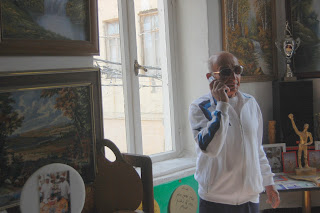Tel Aviv , Yom Kippur

Yom Kippur. Pedestrians and other non-pollutants control the street for one blessed day.
Among the customs of this time, it is common to seek reconciliation with people you may have wronged during the course of the year. The Talmud maintains that Yom Kippur atones only for sins between man and God. To atone for sins against another person, you must first seek reconciliation with that person, righting the wrongs you committed against them if possible.
So, if I've been unkind, unthoughtful or downright nasty to anyone out there during the past year, I'm sorry. OK?
This time last year I broke my arm (after falling off my bike) and was stuck at home with my arm in a sling. To pass the time I wrote a sort of diary. Here's an excerpt on Yom Kippur.
“The streets are noiseless except for the occasional yelping of ecstatic children on wheels who suddenly have full control of the main road (and it’s completely safe!). The quiet is so quiet that it creates a new audio-landscape: the click-clicking of heels on the tarmac, the scuffing of dogs’ paws, a murmured conversation from a living room, the wind in the leaves. No intsi-intsi trance music blasts from a home cinema system, no faltering Chopin emanates from an untuned piano, no synthi-driven oriental tearjerker ululates from a cheap transistor. Just silence is heard and the movement of human beings without motorized assistance.
The visual landscape is altered as well: vistas are rediscovered, forgotten horizons materialize, alternative perspectives present themselves.
Is it possible that our wise sages (of Blessed Memory) anticipated the need for a traffic-free day in Tel Aviv? And not just traffic-free either: food free of course (what’s wrong with an annual fast to detoxify the system) and shopping free, and a smoking free too (at least in public spaces). Almost definitely not. However the goal-oriented western mindset of the progressive secular Israeli (that diminishing 27 % to which we belong) appreciates that Yom Kippur's many benefits can allow us to accept it, collaborate with it (by not driving for example) and, heaven forefend, even enjoy it. And if the day on which a man is supposed to make his peace with the Creator has been turned into No Shopping Day, then so be it. If you have problems recognizing the Creator in the first place but still want to belong to your tribe, secular replacements have to be found to fill the religious bill.”



Comments